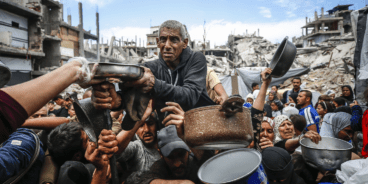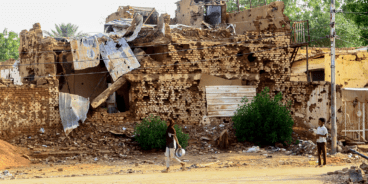
Atrocity Alert No. 65: Kenya, Venezuela and Iraq
Atrocity Alert is a weekly publication by the Global Centre for the Responsibility to Protect highlighting situations where populations are at risk of, or are enduring, mass atrocity crimes.
Kenya
Next Tuesday, 8 August, Kenyans will vote in general elections, including electing the country’s president and local governors. Pollsters have indicated that support for the two leading presidential candidates, incumbent President Uhuru Kenyatta and Raila Odinga, is only separated by a 4% margin. The impending election of some county governors has become contentious as a result of reforms that led to increased power being devolved to local authorities.
Earlier this year the Independent Electoral and Boundaries Commission (IEBC) identified 20 counties as potential hotspots for protests, riots, ethnic clashes, terrorist attacks, and land and resource based conflict. Disturbingly, on 1 August Chris Msando, an IT manager overseeing testing of the IEBC’s electronic voting system, was discovered murdered in Nairobi after disappearing four days earlier.
Violence following the 2007 election claimed 1,133 Kenyans’ lives and displaced 663,000 people. In the aftermath of the crisis, the government implemented important political, constitutional and institutional reforms to avoid a recurrence of violence. While the 2013 elections were generally peaceful, the government has relied upon a Kikuyu-Kalenjin political alliance and has been unable to overcome the root causes of some inter-ethnic disputes. The government has also fundamentally failed to hold perpetrators of past mass atrocity crimes accountable.
During this last week of election campaigning, candidates and party leaders, particularly President Kenyatta and Odinga, should increase peace messaging and publicly denounce any incitement to violence. The government should also ensure that security forces are adequately deployed to polling stations and potential election hot spots. The safety and security of all voters – regardless of ethnicity, locality or political affiliation – must remain the government’s top priority.
Venezuela
Venezuelans continue to face the risk of mass atrocity crimes resulting from deadly political violence and increased government repression following a controversial vote on 30 July to elect a new Constituent Assembly. Neighboring states and the Office of the UN High Commissioner for Human Rights have criticized violent repression of protestors and challenged the legitimacy of the vote.
Despite the government banning all demonstrations that could “disturb or affect” last Sunday’s vote, at least ten people were killed during clashes between security forces and protestors. Security forces have been accused of using disproportionate force against protestors, including water cannons, rubber bullets and batons, while some protestors have also violently attacked police officers. One candidate for the Constituent Assembly who was a supporter of President Nicolas Maduro, was killed in his home on 29 July. A leading opposition youth leader was also assassinated in Cumana.
For several months opposition leaders and legislators who have publicly criticized President Maduro have faced asset seizures, harassment and prosecution. On 1 August national security agents raided the homes of two prominent opposition leaders and allegedly took the men into detention at a military facility.
The government must end the use of disproportionate and deadly force by the security forces and end systematic human rights abuses in Venezuela. All deaths during protest violence should be thoroughly investigated and perpetrators brought to justice.
The international community, particularly the Organization of American States, should pressure the government to hold credible negotiations with the opposition and work to peacefully end the political crisis.
Iraq
Despite the successful recapture of Mosul from the so-called Islamic State of Iraq and the Levant (ISIL) on 9 July, the situation in the city remains dire. According to the Office of the UN High Commissioner for Refugees, at least 837,000 people remain displaced from Mosul, with sporadic clashes and improvised explosive devices laid by ISIL fighters severely limiting their capacity to return.
Following Mosul’s liberation there have also been reports of violent reprisals by members of the Iraqi Security Forces (ISF) against suspected ISIL members. On 9 July the Prime Minister of Iraq, Haider al-Abadi, publicly acknowledged the commission of human rights violations by members of the ISF and has pledged to hold perpetrators accountable. Human Rights Watch has also reported the discovery of an ISF extrajudicial execution site in western Mosul as well as evidence of the alleged killing of several dozen ISIL prisonersin Mosul’s Old City by the 16th Division of the Iraqi army.
Although the immediate priority of the Iraqi government and the international community should be to address the grave humanitarian situation, the pursuit of justice for war crimes and other atrocities remains essential for long-term reconciliation. The UN Security Council and Iraqi government should jointly establish an international investigative commission to collect and protect evidence of mass atrocity crimes perpetrated in Iraq.
Related Publications


Atrocity Alert No. 432: Sudan, Venezuela and Haiti
